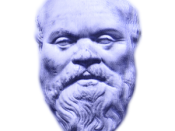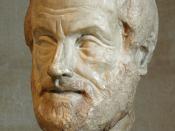According to Aristotle, everything that we pursue or aim at is good. Some of the goods we pursue are activities (e.g. dancing) and some are products of activities (e.g. a good grade on an Aristotle paper). There is only one good that Aristotle thinks is pursued entirely for itself, and not for the sake of anything else. That good, according to Aristotle, is eudaimonia, which usually translates to "happiness." Aristotle rejects pleasure, honor, and wealth as common conceptions of happiness. Happiness cannot be identified with any of these things, but they may be part of an overall happy life. According to Aristotle the three parts of the soul are, the Vegetative--nutritional virtue, which is completely irrational. This irrational part of the soul is responsible for nutrition and growth. The second part of the soul is the Appetitive--moral virtue, which is either rational or irrational. Aristotle believes we share this part of the soul with animals since animals also have desires.
The final part of the soul is the Calculative, which Aristotle believes, is responsible for the human ability to contemplate, reason logically, and formulate scientific principles. Aristotle believed that the mastery of these abilities is called intellectual virtue. When reason is in control we have reached intellectual happiness.



Nosh
this essay could have been more elaborate.
0 out of 0 people found this comment useful.